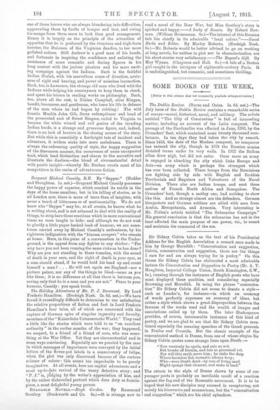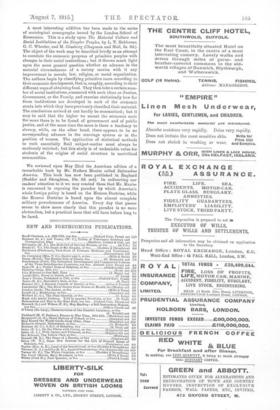Sir Sidney Colvin takes as the text of his Presidential
Address for the English Association a remark onto made to him by George Meredith : " Concentration and suggestion, Colvin, concentration and suggestion, those are the things I care for and am always trying for in poetry." On this theme Sir Sidney Colvin has elaborated a most admirable lecture On Concentration and Suggestion in Poetry (Mr. A. V. Houghton, Imperial College Union, South Kensington, S.W., le.), running through the instances of English poets who have most displayed these qualities, and considering especially Browning and Meredith. In using the phrase "concentra- tion" Sir Sidney Colvin did not mean to denote a style— such as Landor's, for instance—in whioh an economy of words perfectly expresses an economy of ideas, but rather a style which shows a great disproportion between the fewness of the words used and the wealth of images and associations called up by them. The later Shakespeare provides, of course, innumerable instances of this kind of poetry, and we are glad to see that Sir Sidney Colvin men- tioned especially the amazing speeches of the Greek generals in Troilus and Cressida. But the classic example of the concentrated method is Donne, from one of whose elegies Sir Sidney Colvin quotes some strange lines upon Death :-
"Now wantonly ho spoils, and oats us not,
But breaks off friends, and lots us piecemeal rot. Nor will this earth serve him ; he sinks the deep Whore harmless fish monastic silence keep; Who—were Death dead—by roes of living sand Might sponge that element, and make it land."
The return to the style of Donne shown by some of our younger poets is probably an inevitable result of a reaction against the fag-end of the Romantic movement. It is to be hoped that his new disciples may succeed in recapturing, not merely his bizarreries and mannerisms, but the " concentration and suggestion" whiCh are his chief splendour. A most interesting addition has been made to the series of sociological monographs issued by the London School of Economics. This is a study upon The Material Culture and Social Institutions of the Simpler Peoples, by L. T. Hobhouse, G. C. Wheeler, and M. Ginsberg (Chapman and Hall, 2s. 6d.). The object of the work may be described briefly as an attempt to correlate the economic progress of primitive peoples with changes in their social institutions ; but it throws much light upon the more general question whether an advance in the material circumstances of a society carries with it any improvement in morals, law, religion, or social organization. The authors begin by classifying primitive races according to their economic development, that is, roughly, according to their different ways of obtaining food. They then take a certain num- ber of social institutions, connected with such ideas as Justice, Government, or the Family, and examine statistically bow far these institutions are developed in each of the economic strata into which they have previously classified their material. The conclusions arrived at can hardly be summarized; but it may be said that the higher we mount the economic scale the more there is to be found of government and of public justice, and at the same time the more is there a tendency to slavery, while, on the other hand, there appears to be no corresponding advance in the marriage system or in the position of women. The application of statistical methods to such essentially fluid subject-matter must always be cautiously watched; but this study is of undeniable value for students of the origins of social structure in uncivilized communities.



































 Previous page
Previous page